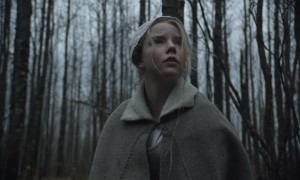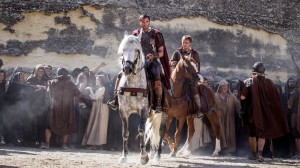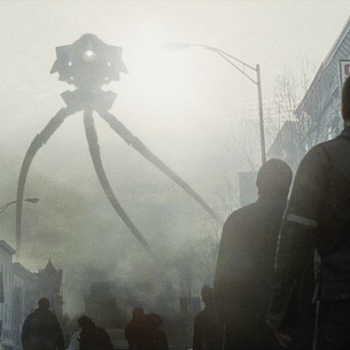Last weekend, indie horror film “The Witch” debuted head-to-head against faith-based historical drama “Risen.” One film was a horrifying depiction of evil, the other an inspirational tale of faith. “The Witch” courted controversy by winning the endorsement of The Satanic Temple; the same day that endorsement was announced, Pope Francis met with “Risen” star Joseph Fiennes. It had, as I previously wrote, all the makings of a box office holy war. So in the end, with tickets tallied and opening weekend numbers crunched, who won?
Well, Deadpool and Po.
Yes, the R-rated Marvel movie and the kid-friendly “Kung Fu Panda 3” dominated the box office. But “Risen” and “The Witch” had respectable weekends as well. “Risen” came in at third place with $11.8 million, trailed closely behind by “The Witch” at $8.8 million. For both films to debut so well is actually fairly surprising. Faith-based films are gaining traction at the box office, but historical dramas like “Risen” don’t always attract crowds. And while a fourth-place debut for “The Witch” seems low, consider that it’s a small, slow burn of a movie told in Jacobean English. That’s not bad box office, especially when you consider that the film opened on 900 fewer screens than “Risen” and ended up with a larger per-screen average.
“Risen” and “The Witch” aren’t really competitors, of course. “Risen’s” target demo probably isn’t too interested in a movie where a family is plagued by supernatural evil, and I doubt the people who turned out for “The Witch” much cared about seeing Fiennes go fishing with the disciples. But I still think it’s interesting to talk about the films together, especially in light of what this says about movies dealing with faith.
I gave both movies positive reviews. “Risen” has its flaws, but I thought it was a clever twist on the Christ story, with a back half that is moving, even if that’s where the majority of its narrative flaws lie. “The Witch” is truly terrifying, and I haven’t been able to shake it. The film set out to horrify and disturb; its mission was accomplished.
“The Witch” is a bleak look at the consequences of ultra-strict religion, and its characters’ Puritan faith and supernatural fears are both treated seriously and are integral to the plot. “Risen” is about the resurrection of Christ, and the impact it has one one Roman guard. The final scenes of “The Witch” disturbed me and shook me on a spiritual level. “Risen” respectfully takes on a story that I believe to the most important moment in human history.
But here’s the thing: several weeks after seeing it, I’m still thinking about “The Witch.” And while I enjoyed “Risen,” I have to be honest that there was more theological wrestling and examination over a movie about a witch than a movie about Jesus.

“Risen” was very well received by audiences, with an A- Cinemascore rating, and it’s no surprise why. This is a film that courted a very specific demographic; it’s pretty much the definition of preaching to the choir. There’s no controversy; this is a movie that sticks to orthodoxy through and through, despite the pretense of a mystery in its first half. Its second half is basically a retelling of the final chapters of the gospels, with a Roman centurion grafted onto the biblical narrative. Audiences who went in wanting their views reinforced walked out having received just that. I knew this film would be embraced by the evangelical crowd the moment the screening I was at ended, when the audience — composed mainly, I believe, of people from the evangelical community — burst into applause.
And there’s nothing wrong with that. I like “Risen.” It may be clumsy and on the nose, but it’s helped out immensely by strong performances, capable direction and a clever premise. I was moved by it in places, mainly because it was causing me to remember a story that I hold very dear. I would likely have been offended had they pulled a “Davinci Code”-level twist on the resurrection. The film was pitched right at Christians, telling our story with drama, respect and skill. I walked away moved and surprisingly impressed. This will likely become perennial Easter viewing in my life.
But was I changed? I’m not so sure.
Readers of this site know that throughout the Lent season this year, I’ve been watching films about the Christ story, many of which are a bit unorthodox. And what I find fascinating is how each of these films so far have challenged and enriched my thinking of Christ and Christianity. Pasolini’s “The Gospel According to St. Matthew” dramatizes Christ’s role as a champion for the sinner and underdog, and “Jesus Christ Superstar” is a reminder that no one who encounters Christ walked away with a neutral reaction. The best films about faith have always prompted this kind of spiritual wrestling and chewing, whether it’s “Babette’s Feast’s” portrayal of the joys we lose when we let legalism take hold or “Into Great Silence’s” reminder of how hard it is for us to just be still and contemplate God. I have an issue with films that isolate Christian art from the the mainstream or that use films primarily as evangelism tools. However, I do think there is room for art that is made specifically for the church. Whether it’s an act of worship on behalf of the creator or a prophetic work designed to edify, there is a place for art that speaks to Christians and causes them to meditate, reflect and grow (this is a topic I actually plan to delve into deeply in a few weeks).
I don’t think “Risen,” as entertaining as it is, does that. I’ve written before about how faith-based films basically exist to deliver “attaboys;” they’re pieces of Christian fiction aimed at a Christian audience with the goal of patting them on the head and telling them they’re doing a great job. There’s nothing inherently wrong with art that inspires and makes you feel good, or even about retelling beloved stories, but there is a danger of encouraging spiritual stagnation and isolation. We don’t grow in our faith by reading the stories of Moses and Noah over and over; we grow by studying the Word, wrestling with it, questioning it and letting it it transform our minds. Art can be another tool to complement our study, but it won’t help us change until we stop hearing the same stories over and over but start being challenged by them, walking out of the theater with new questions, even if they’re troubling.
I’m not saying “The Witch” is the perfect example by any means. Many Christians feel they should stay away from it, and I respect that, as I’ve made similar decisions with different movies. The film may have also been too much for its own audience, as it only scored a C- Cinemascore rating. “The Witch” isn’t a faith-based movie; it’s a pitch-black, unsettling horror movie. And yet, it provoked questions that I am still mulling over. Its depiction of a sin-obsessed Christianity that speaks of grace in theory and denies it in practice is familiar from the ultra-strict fundamentalist churches I attended as a child. What are the effects of that on a person; does it drive them away from the faith? Is a Christianity that’s void of grace a blasphemous thing, a perversion of what we believe? Why does the film’s end so chill me? I’ve seen film’s with bleaker and more nihilistic endings, but this one truly rattled me. Is it just the work of a skilled filmmaker? Or is it because of my faith — do I reject this film’s conclusion because its worldview is so false to me? As far as these film’s “messages” go, I side more with “Risen” than “The Witch.” But “The Witch” prompted actual spiritual questioning and reflection; “Risen” just gave me the fuzzies. I had deeper thoughts about faith after seeing “Hail, Caesar” than I did after “Risen.”
Again, I’m not saying to run out and see “The Witch.” It’s not for everyone at all. And I hesitate to frame my answer as “Faith-based movies need to be more like ‘The Witch,'” for obvious reasons. But I wish more faith-based films actually approached faith with the seriousness that some mainstream films do, asking us to lean into hard questions and pushing deeper at the implications of our beliefs.
I enjoyed “Risen.” But I would have enjoyed it more had the film not turned into a traditional Bible story in the back half. Had Clavius never met Christ or seen proof of the resurrection, but still had to grapple with the missing body and the confident, joyful disciples, the movie would have had more power; instead, it’s undercut by its Hallmark card ascension. The Bible tells us Christ’s death and resurrection weren’t the end; the last books of the New Testament are filled with letters wrestling with how we live in light of this amazing story. “Risen” hints at this in its final moments, which show Clavius — now separated from the disciples and having abandoned his Roman post — wandering through the desert. That image is powerful, and I respect the movie for not ending on a definitive conversion. But given all that Clavius has seen and heard, there’s no doubt where he’s going. What if he was wandering without truly knowing what to think?
This doesn’t kill “Risen,” but it does keep it from being a more effective movie. But it’s this same back-patting that gives so many other faith-based films a smug, defensive posture and makes them feel more like propaganda than explorations of the faith. What if, in “Facing the Giants,” the team vowed to praise God whether they won or lost … and then lost? What if the “Fireproof” couple had to deal with a devastating affair instead of arguing about candles? What if the little boy from “Little Boy” had to grapple with unanswered prayers and a war-time tragedy instead of having God drop an atomic bomb to bring his dad home?
Listen, there’s a place for art specifically for the church. I support it. I’ve been enriched by it. But preaching to the choir is not the answer unless that preaching convicts, encourages or illuminates. And until our art leans into the hard questions of faith and demands us to dig deeper, it’s always going to feel like a shallow, hollow product of a defensive, aloof culture, and it’s going to prevent our growth. “Risen” is a good start, but there’s still a ways to go.














